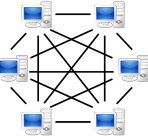 Over Christmas, I introduced someone to the wonders of Peer-to-Peer (P2P) TV. He couldn’t believe that he could watch channels from around the world, in real time for free. His immediate reaction was, “Is it legal? Am I going to go to jail for this? Please switch it off and let’s watch BBC1. Get out of my house.”
Over Christmas, I introduced someone to the wonders of Peer-to-Peer (P2P) TV. He couldn’t believe that he could watch channels from around the world, in real time for free. His immediate reaction was, “Is it legal? Am I going to go to jail for this? Please switch it off and let’s watch BBC1. Get out of my house.”
For anyone like him, especially those of the older generation, it’s an understandable reaction. You don’t get anything for free in this life right? But P2P software allows you to do many things for free – make phone calls, share films, music and software, watch TV channels etc – all you need is an internet connection. It’s increasingly used by research, medical, business and military institutions to improve data flow exchanges although for the purposes of this post, I’m only looking at the things that the average home user uses them for. Much of the the suspicion and fear surrounding P2P has also been generated by the furore in the media that’s surrounded the “illegal” downloading of music and movies via P2P networks such as eMule and LimeWire. In a few cases, such downloading has been penalised with massive fines and even imprisonment under copyright laws so people are right to be concerned.
To understand the legality issue surrounding P2P, it’s first of all useful to understand exactly how it works. It’s really not that complicated. Peer-to-Peer means exactly that – P2P software enables your PC or Mac to link with other computers and share both bandwidth and the contents of your hard drive. A pure P2P system is incredibly democratic because since it’s entirely interlinked and there is no gatekeeper such as a vendor or middleman. Nowadays, not all P2P systems are pure – they vary from centralised, such as Napster which effectively do feature a main server or gatekeeper, to completely decentralised such as Gnutella. But the principle – a user generated system of file sharing – remains. The result is that
you suddenly have access to music, movies and virtually any other file that you never dreamed possible, or at least, would normally have to pay a small fortune to obtain. And the most amazing thing of all is that it’s absolutely free. The beauty of this is that the more people that use it, the bigger, stronger and faster it gets.
The legality issue basically affects those P2P networks that are decentralised. Centralised systems such as Napster are subscription only. In other words, for a monthly or annual subscription, you can download to your heart’s content without worrying about legal consequences. In these cases, multimedia corporations happily provide music and movies for download in the knowledge that they are making money from it. Meanwhile applications such as eMule, which are based on the Gnutella P2P network and its variants, are completely decentralised and so there’s no gatekeeper to collect revenue. This is obviously a commercial broadcaster’s worst nightmare.
So where does the law stand on the legality of decentralised networks? In a nutshell, there’s nothing illegal about a P2P program such as eMule or LimeWire which is why they’ve never been shutdown or the developers thrown behind bars. The law puts the onus on the user to use the network legally. In other words this means that if you have a copyrighted file on your hard drive, and you choose to share it via P2P software, you’re immediately in breach of the law. The same goes for if you search for copyrighted material, such as a film or album, and download it. This includes TV shows such as Lost and Prison Break which are an increasingly popular type of download. David Price, Head of Piracy Intelligence at Envisional in the USA explained the extent of the downloading to BBC’s “Click” program:
Over one month you might see 10 million downloads just of the clients that are being used to file share. You could easily see a million downloads of a single TV episode.
The Recording Industry of America (RIAA) has managed to get laws passed which enable it to sue users who do this in the case of music. In reality of course, this proves very hard in practice. The internet is so huge, and the users so widespread, that it would be virtually impossible to stop people doing it which is why millions do it everyday. Sharing anything else – such as documents or multimedia files that you yourself have created, is perfectly legal perfectly legal.
So how could you be traced?
When you connect to a P2P network, your IP address, unique to your computer, is visible. Broadcasters can then approach your Internet Service Provider and ask them to divulge your name and address. This is mainly done by an organisation called the Federation Against Copyright Theft (FACT). However, it’s not quite as simple as that for organisations such as FACT. Price added:
ISPs are very unwilling to supply subscriber details. They see it as being a matter of privacy and they are not prepared to reveal those kinds of details unless they are given a court order.
This is why much depends both on the laws of the country you live in and the policy of your ISP (which will usually be dictated by those laws). It’s therefore really up to you to check whether your country’s laws allow it. In most countries file sharing is illegal although as mentioned, the law is rarely enforced. However, in countries such as Canada and France P2P file sharing has been deemed completely legal much to the delight of users and disgust of broadcasters and content producers. In the case of Canada, the presiding judge ruled that:
I cannot see a real difference between a library that places a photocopy machine in a room full of copyrighted material and a computer user that places a personal copy (of a song) on a shared directory linked to a P2P (music sharing) service.
The situation regarding TV broadcasting applications such as SopCast and TVUPlayer is very similar. The applications in themselves are not illegal but it’s clear that they carry the channels of major broadcasters that they do not have the licence for. Again, the CEOs and developers claim that it is the users responsibility to ensure they are not uploading or streaming channels they don’t have a licence for.
If you’re still worried about using P2P networks, then check the laws in the country where you live. In addition, you can always use legal P2P networks such as TV broadcaster Joost and P2P file sharing network Napster. My own prediction is that eventually, ISPs will eventually be forced to cooperate with authorities in cracking down on users although the logistics of policing P2P file sharing are an awesome challenge to say the least. P2P file sharing is one of the best aspects of the internet in my opinion. A more democratic system is hard to imagine. However, I also understand the broadcasters and recording companies side of things. I’m not convinced by their argument that P2P significantly harm the sales of DVDs and CDs. In Canada for example, one major study, backed by commercial industry body “Industry Canada” concluded that there is no evidence either way to prove negative or positive effects of P2P sharing on sales. However, if P2P did ever start to affect sales significantly this would mean less money for artists and broadcasting and that could mean a severe decline in the quality of programming. In the long run, I think it would be beneficial if all P2P file sharing involved some kind of subscription but ONLY if it can be guaranteed that the proceeds go directly to the creator.
In the meantime, the responsibility is yours.

